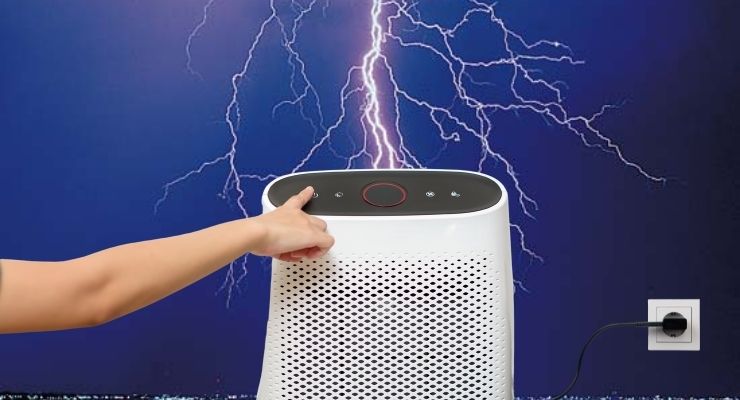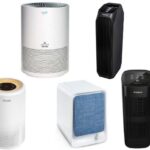One of the most shared queries newbie buyers of air purifiers have is “Do air purifiers use a lot of electricity?” Let’s try the queries with more retorts. Or “Do air purifiers use a lot of energy?” here, given that an air purifier must work 24 hours a day, 7 days a week, to be as useful as possible, it is a completely understandable question. So, in this article, we have decided to address this question and give you an idea of how much electricity an air purifier uses.

Do air purifiers use a lot of energy?
You’re here because you need an answer to Air purifiers to consume a lot of energy. How much electricity does an air purifier use in general? Although we know that running an air purifier on a 24/7 basis would benefit our indoor air quality, it is a high priority to know if an air purifier consumes or does not consume much energy. A high electricity bill has never made anyone happy. No, I’m not. You’re not either.
The average air purifier consumes 550-kilowatt hours per year of electricity or approximately the same amount of energy as a modern refrigerator. If you are interested in energy saving, choose an energy-efficient air purifier. These energy-efficient air purifiers consume 40% less energy than other models, reducing the energy consumption of the air purifier by 225-kilowatt hours per year.
Further, reduce the energy consumption of the air purifier by pairing the device with a smart socket to connect the purifier to the routines of your smart home. The use of a smart socket helps you monitor energy consumption and remotely control the air purifier from anywhere, inside your home or even from outside if it can be managed via the app.
Here are some factors you need to keep in mind:
- How many watts does your air purifier use?
- How long should you run an air purifier?
- What is the speed of the fan?
- How much electricity does an air purifier use?
How many watts does the air purifier use?
The first thing you must know to check if you use a lot of energy or not in your air purifier (or essentially any electrical appliance) is to read the power consumed in usage (commonly in watts) shown on its label. Compare this to the typical power of an old incandescent light bulb, 60 watts, and a modern desktop computer, equal to 365 watts.
One unit in the electricity bill is equivalent to 1 kW (1000 watts) per hour. More clearly, if the power of your electrical devices is equal to 1 kW and you run them simultaneously for a full hour, your electricity bill increases by one unit, equal to about 25-30 cents spent. With a typical power of a 50-200 watts air purifier based on the model, you may run it continuously for 20 hours to increase it by one or more units.
Your air purifiers are much more energy-efficient than most of your most popular electrical devices. As you can see, using an air purifier will not significantly impact your electricity bill. Of course, a larger air purifier with better filtering power could consume a little more than a small and less filtering one. However, the absorbed power is not a direct indicator of filtering power.
As you can see, an air purifier won’t have a significant impact on your electricity bill. We would be delighted to provide you with a few examples of how many watts your air purifier consumes.
- Levoit vital 100 – 55 Watts
- Alen breathe smart 75i – 45 Watts
- Bissell air320 – 116 Watts
- Honeywell HPA300 – around 130 W
- Alen breathesmart fit50 – 60 Watts
How many speeds does the fan have?
Second, you must know there is the number of fan speeds of your air purifier. An air purifier usually has at least 2 fan speed settings. The air purifier consumes less energy; typically, just half of the highest settings are used.
Let’s take a look at the list of air purifiers available right now.
- Levoit vital 100 – 3 Fan Speeds
- Alen breathesmart 75i – 5 Fan Speeds
- Bissell air320 – 5 Fan Speeds
- Honeywell HPA300 – 5 Fan Speeds
- Alen breathesmart fit50 – 4 Fan Speeds
How long should you run an air purifier?
Leave the air purifier on 24/7 and keep doors and windows closed when in use. It is recommended that you run the unit on the highest setting when you are not in the room and on a low setting when you are nearby. If desired, purchase an air purifier that is certified for a larger area to work effectively in a lower setting.
How much electricity does an air purifier use?
The first step to answer this question is to understand electricity consumption. The amount of energy consumed on your electricity bill usually measures the kilowatt-hours of all electrical devices in your home. Another way to say 1,000 watts of power used one hour is a kilowatt-hour. Thus a 1,000 watt (or 1 kilowatt) one-hour device would add 1-kilowatt hour (kWh) to the bill.
Since this is the way electricity is measured, we feel it is the best method for measuring the energy consumption of the air purifier and giving you a clear idea of how much electricity an air purifier uses. However, before entering the consumption of air purifiers, let us consider the energy consumption of some other common household appliances as a reference. Note that the following are approximate averages, and your appliances may vary:
- 49-inch LED TV: 85 W
- Laptop: 50-100W
- Desktop computer: 100-450W
- Refrigerator: 100-200 W
- Dishwasher: 1,200-1,500 W (1.2-1.5 kW)
- Air conditioner: 1,000-4,000 W (1-4 kW).
Residential air purifiers can vary a little in their power ratings. Still, they mostly stay in a range of 50-200 W, roughly equivalent to a home refrigerator or desktop computer. Taking it a step further, let’s try to estimate what that means for your electricity bill. Electricity costs vary depending on the supplier: we assume they are 0.1371$ / kWh.
Calculator for the Energy
You know the watts and kWh, and now I’ll give you a quick calculator for the energy used: Electricity usage ($) = Unit electricity cost ($) * Air purifier power (kW) * Usage time (hours). With 1 unit cost, which is 13.71 cents per kWh, if you run your 50 W air purifiers for 24 hours a day, you have 1200 Wh or 1.2 kWh. So you will spend 1.2 * 0.1371 = 0.16452 $ per day. Please keep in mind that these are rough estimates; they should provide you with a general idea of what to expect in the future.
(Note: May 2021 data shows that the United States average price per kilowatt-hour is 13.71 cents (kWh).
How to save electricity while using an air purifier?
Of course, running a power supply for a long time increases electricity consumption.
If your air purifier contains several filters and you run it for many hours, you will wear out the filters and use an enormous amount of electricity.
It is therefore essential that you learn how to save electricity with your air purifier.
Some recommendations are as follows:
Tip 1: You should use it if you’re at home or have one in your office. Take it to the lowest level if you use plants to produce oxygen or have a particular area smoke.
Tip 2: Use your air purifier by the time of year. Pollen from weeds, for example, is a problem, especially in summer. Keep your air purifier constantly working in summer and store it in winter.
Calculation of the energy consumption of an air purifier
Let’s do the calculation assuming a 50W air purifier:
How many hours per week is it on ?: The most important thing to calculate the monthly expense that we are going to have, is to know how long the device will be on; we are going to assume about 24 hours a day (24 x 7 = 168 hours per week)
Monthly hours: to calculate the monthly hours that the air purifier will be on, we simply multiply the weekly hours by 4: weekly hours = 168 x 4 = 672 monthly hours.
Purifier power: Knowing the power of our purifier, you will find it specified in W on the product label, or if you have not yet purchased it, look at the seller’s specifications. In our case, we assume the power of 50W.
Formula to calculate electricity consumption: The price of electricity is around 0.1371 $ KWh; with this, we can easily calculate the price we will have to pay.
(Note: May 2021 data show that the average U.S. price is 13.71 cents per kilowatt-hour (kWh).
Monthly price = Electricity price x Power / 1000 x monthly hours
Which in our example would give us: Price = ($ 0.1371 x 50/1000) x 672 = $ 4.60656 per month.
Best energy star-rated air purifier and yet effective?
A HEPA air purifier has a lot of operating hours. In addition, the device is on almost day and night. It is therefore essential for consumers that energy consumption is low. This prevents unwanted surprises in the energy bill.
The Medify MA-40, H13 filter removes 99.97% of airborne particles. The system can clean 1,300 sq. ft. of dust, pollen, and other allergens in an hour.
This Energy Star-certified product includes a visible air quality indicator that continuously monitors particle levels. Several organizations dedicated to consumer health have independently certified Medify. It is medical-grade or highly energy-efficient according to CARB, ETL, and California Energy Star.
Traditional filters miss asbestos, paint pigments, insecticides, carbon dust, bacteria, and virus carriers. The Medify protects you from virtually all airborne threats down to 0.1 microns. The preinstalled filter lasts over 2,500 hours and is easily replaceable. After four months of use, remove the heavy-duty tempered glass panel to replace the filter cleanly.
The Medify uses ionization inside the filter to electrostatically charge particles and trap them inside. This keeps even the tiniest particles inside the unit. With four distinct fan modes, pre-programmed timers, and night-and-day options, the Medify is as versatile as you need it. You can even turn off the ionizer to save even more money.
The Medify MA-40 is Ideal for larger rooms like living, kitchens, bedrooms, and shared offices. With a child lock, this safe air purifier is suitable for young children’s rooms.
Not sure if you want to contribute to Medify?
As long as you change the filters regularly, all parts are guaranteed for life. The Medify is louder than other air purifiers on the market. Customers compare Medify’sMedify’s noise level to a standard air conditioner on the highest setting.
Conclusion
When looking for an air purifier, always look at the CADR ratings, energy-efficient, and filter types to get an idea of how effective the purifier is for your specific needs. the amazing amenity of the Best Air Purifiers for Basement can gratify you.
Once you’ve found an air purifier that offers the best filtration for your space, evaluate secondary attributes such as noise level and portability. Below you will find the best air purifiers in a row.
- Bissell air320
- levoit vital 100
- Alen breathesmart 75i
- coway airmega 300
- levoit dual 100
- levoit air purifier vital 100
- Alen breathesmart fit50
- coway airmega 400
- Honeywell hpa300
- Medify MA-40
We hope you’ve got the correct answer to ” Do air purifiers use a lot of electricity?” or ” Do air purifiers use a lot of energy” keep following us to know why in your home you need an air purifier.




